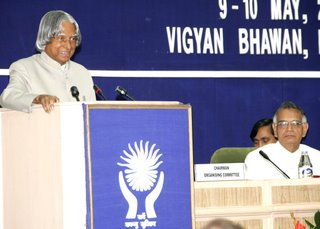Vision 2020 — Dr Kalam's six-point plan
Dr. P. V. Indiresan, former director, IIT Madras.
Dr Kalam's vision is to make India a developed country in another 15-20 years. That raises the question, "What makes a nation a developed one?" There is a fable of a pious person who prayed to God for long years until finally God agreed to grant him a boon, but one boon only. The old man thought about it shrewdly, and then asked of God: I want to feed milk to my grandson's grandson in a golden cup while standing on top of the seven story family mansion enjoying the beauty of its garden. The boon he asked was one only, but it had many dimensions including long life, good health, progeny for several generations, wealth, good environment and the like.
We could drum up a similar situation for our own vision of development. For instance, consider: In fifteen years, all our mothers will enjoy browsing the Internet in modern, well-appointed, bungalows searching for new places to go on holiday. This definition centered on the mother ensures gender justice. The short time frame of 15 years implies rapid development. The ability to browse on the Internet pre-supposes high-quality literacy. The bungalow guarantees high quality environment. All these and the proposition about holidays are proof enough for large surplus income and substantial wealth. Such a Vision need not be a dream; it is feasible. The TIFAC Vision 2020 report on `Driving Forces and Impedances' describes its Vision in a different way. It says: "In the past 35 years, South Korea has made greater economic progress than any other country in the world. So, we can take the progress of South Korea as one possible model. Then, we may aim to attain by 2020 the levels South Korea has already reached at the present time in year 1995. Then, we would not only have emulated the South Korean miracle but would have closed the gap by ten years. Instead of being 35 years behind as we are now, we would then be only 25 years behind."
Read the full article here







